Search the Special Collections and Archives Portal
Search Results
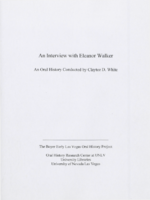
Transcript of Interview with Eleanor Walker, June 3, 2004
Date
Archival Collection
Description
Eleanor Walker served as President of the Las Vegas Chapter of NAACP from 1971-1975.
Text
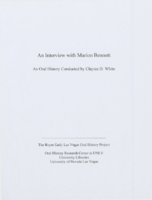
Transcript of Interview with Marion Bennett, July 2, 2009
Date
Archival Collection
Description
Marion Bennett has served twice as local NAACP President. He also talks about the integration of casinos, schools, and housing. Marion has been the pastor for Zion Methodist for over 40 years.
Text
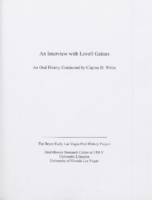
Transcript of Interview with Lovell Gaines, July 1, 2009
Date
Archival Collection
Description
Lovell Gaines moved to Las Vegas from Reno in 1975, becoming the local NAACP President in early 1980s. Lovell worked at the Nevada Department of Corrections for over 30 years.
Text
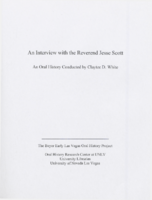
Transcript of Interview with Rev. Jesse Scott, June 29, 2009
Date
Archival Collection
Description
Rev. Jesse Scott served as executive director and four-term president of Las Vegas NAACP branch.
Text
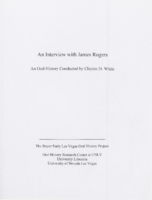
Transcript of Interview with James Rogers, June 30, 2009
Date
Archival Collection
Description
James Rogers was President of the local NAACP from 1996-2000. He is also the Pastor of Greater New Jerusalem Church.
Text
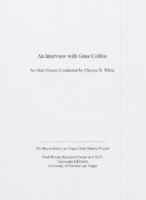
Transcript of Interview with Gene Collins, July 16, 2009
Date
Archival Collection
Description
Gene Collins served as President of Las Vegas chapter of NAACP 1998-2001. He aslso worked at the Nevada Test Site as an electrician.
Text
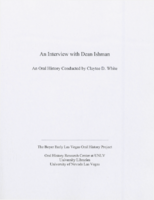
Transcript of Interview with Dean Ishman, July 2, 2009
Date
Archival Collection
Description
Dean Ishman moved to Las Vegas in 1995, becoming the Las Vegas NAACP branch president in 2003.
Text
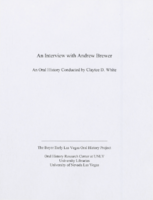
Transcript of Interview with Andrew Brewer, July 1, 2009
Date
Archival Collection
Description
Andrew Brewer became Las Vegas NAACP president in 2008.
Text

Transcript of Interview with Barbara Kirkland
Date
Archival Collection
Description
On a sunny day in 1946, the train from Shreveport, Louisiana, stopped at The Plaza hotel in downtown Las Vegas like it always did. But on this particular day, Atha Toliver and her only child, twelve-year-old Barbara, stepped off the train and onto the dusty Western street of Fremont. Narrator Barbara Bates Kirkland recalls that event and living in Las Vegas for most of the next seven decades during this 2004 interview. Like many others who migrated from the South, Barbara Kirkland’s mother would find employment as a maid. A friend who already lived in Las Vegas had told her of the good paying jobs as private maid. So Atha who was determined that her daughter would get an education and a finer future saw this as her opportunity to achieve this for her daughter. Later, the entrepreneurial and creative mother opened Eva’s Flower Basket, a floral shop that Barbara operates in her retirement from teaching. Barbara returned to Louisiana for her senior year in high school, attended Southern University in Baton Rouge, and then returned to Las Vegas to teach first grade at Westside School. Barbara was active in the community, was a founding member of Les Femmes Douze, involved with Zion United Methodist Church and was friends with many of the early African American community leaders at the time. She talks about these, describes various neighborhoods where she lived and about raising her own two children in Las Vegas. Barbara was a founding member of Les Femmes Douze. AKA/Akateens.
Text

Transcript of Interview with Estralita Williams
Date
Archival Collection
Description
Estralita Williams is a native of Las Vegas. Her father was a pastor; she and her sisters sang with choir that backed up celebrity musicians such as Paul Anka. Estralita worked for the EOB.
Text
